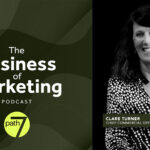By Anne Elisco-Lemme, executive creative director, Duncan Channon
Seven years ago, a friend, an advertising freelance writer, asked to pitch me an idea. She showed up at my home with two beers, her kids and a laptop. Ten minutes later, she flipped open her computer to show page one of a presentation that read, “Why I can only work on accounts that have purpose and why I want to build this practice at Duncan Channon.” Before she could barely get a word out, I slammed my fist on the table and loudly said, “Sold!” She laughed and said, “There are like 20 more pages…” to which I replied, “I don’t need to see them.” We never got to the beers.
What she didn’t know is that mentally, I was already there. For the past four years I served as the creative director on the California Tobacco Prevention Program (CTPP) business and knew firsthand what this kind of work meant. I’d already done beer, I’d done chips, I’d done fashion – and don’t get me wrong, I loved working on those businesses – but something in me shifted when I started taking on the tobacco industry daily.
What emerged was the notion of “those other businesses don’t need me.” The hot, sought-after categories have plenty of people banging down the door to get in. But work that makes a social impact? Not so much. It’s weighed down with preconceived beliefs like: clients won’t want to take risks. Budgets will be small. We can’t be creative. None of which is categorically true.
After working with CTPP, we’ve gathered other accounts in the category. We’ve helped people overcome lifelong fears of putting their trust into medical research when decades of horrific abuse have told them otherwise. We’ve shed light on what it truly means to be in the foster care system. We helped get ballots into the hands of disenfranchised voters of color. The list goes on.
When you work on businesses like this, you start to see the world differently because you’re finding answers to deeper questions. Working on the anti-tobacco business, I learned that most adults started smoking in their early teens. They were kids (or as the tobacco industry has called them in documents “replacement customers”) whose young brains were wired for addiction. So I now find myself – by my own volition and on my own time – speaking at City Council meetings to oppose misguided ideas such as: “Let’s get law enforcement involved when underage kids are vaping.”
Working on the Covid vaccine campaign for the state of California, I was offered coffee from Mexican farm workers in their portable home next to the fields in the pre-dawn hours. Unable to speak Spanish, I watched their faces and the face of my producer (who spoke Spanish beautifully) as they told stories of being separated from the people they love for over 13 years and what kind of toll that takes. But also evident was how proud they were to be aiding their families back home. These were stories of hope and resistance. Yes, they would get the vaccine. Yes, they would allow us to film them. Their families relied on them to remain healthy and they wanted to help.
I had the honor of getting to know a 30-year old male wrestling with the trauma of foster care. Formerly a dancer when he was younger, he had given up on this dream. But through the short film we made and with help of a director who has the deepest, purest soul I have ever seen, he tapped into a strength and long-discarded belief in himself – and began to dance again as a way to heal. A short time later, he got accepted into a world-prodigious dancing program in Italy.
My world is so much richer working on these accounts. But it’s not just me. I often have creatives ask to be put on our social impact work because, as one person put it, they “Want to do something that feeds their soul.” And our Director of Talent Acquisition and Equity often relays stories of how prospective talent cites this work as something that makes our agency appealing and different.
In an unjust and heartbreaking world where so many of us are screaming into our own echo chambers, this is a tangible way to actually do something.
This kind of work takes us ever so briefly out of a world of capitalism and commercialization – into a world of community and compassion. And as I typed out the next words “and who wouldn’t want that?” I hit the delete button…back…back… back… because that isn’t entirely accurate. It’s not about want. It’s about need. Who doesn’t need that?







